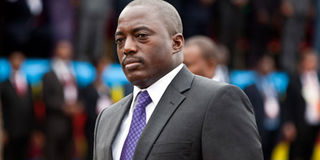DR Congo's Kabila rejects foreign pressure on electoral process

Democratic Republic of Congo President Joseph Kabila. Political tension is growing in the province of Katanga, South Eastern DRC over the presumed intention by President Kabila to seek a third term in office come 2016. FILE PHOTO | GWENN DUBOURTHOUMIEU |
What you need to know:
He questioned the "sound basis on which non-Congolese people invite themselves to take part in the debate, however well-intentioned they might be."
The Congolese leader is under strong international pressure, particularly from the United States and France, to step down at the end of his second elected term, in December 2016.
KINSHASA
Democratic of Congo President Joseph Kabila on Monday said he would reject foreign admonitions on the electoral process in the vast central African country.
"We are always ready to receive advice, guidance and suggestions, but never injunctions," Kabila said in a speech to both houses of parliament in Kinshasa.
He questioned the "sound basis on which non-Congolese people invite themselves to take part in the debate, however well-intentioned they might be."
The Congolese leader is under strong international pressure, particularly from the United States and France, to step down at the end of his second elected term, in December 2016.
"We will urge leaders not to alter national constitutions for personal or political gain," US Secretary of State John Kerry said shortly after talks with Kabila at a major US-Africa summit in Washington in August.
CIVIL WAR
Kabila was propelled into office after the death of his father Laurent Kabila in 2001, at the height of a civil war that drew in six foreign armies on rival sides and became known as "Africa's Great War".
He won elections in 2006 and again in 2011, in which the opposition cried fraud and which foreign monitors said lacked credibility.
Last week, Kabila named a new government, more than a year after promising to appoint a cabinet of national unity.
The DRC has vast, widely coveted mineral resources, but years of neglect have left infrastructure and basic services in ruins, while serious unrest prevails in the east.





